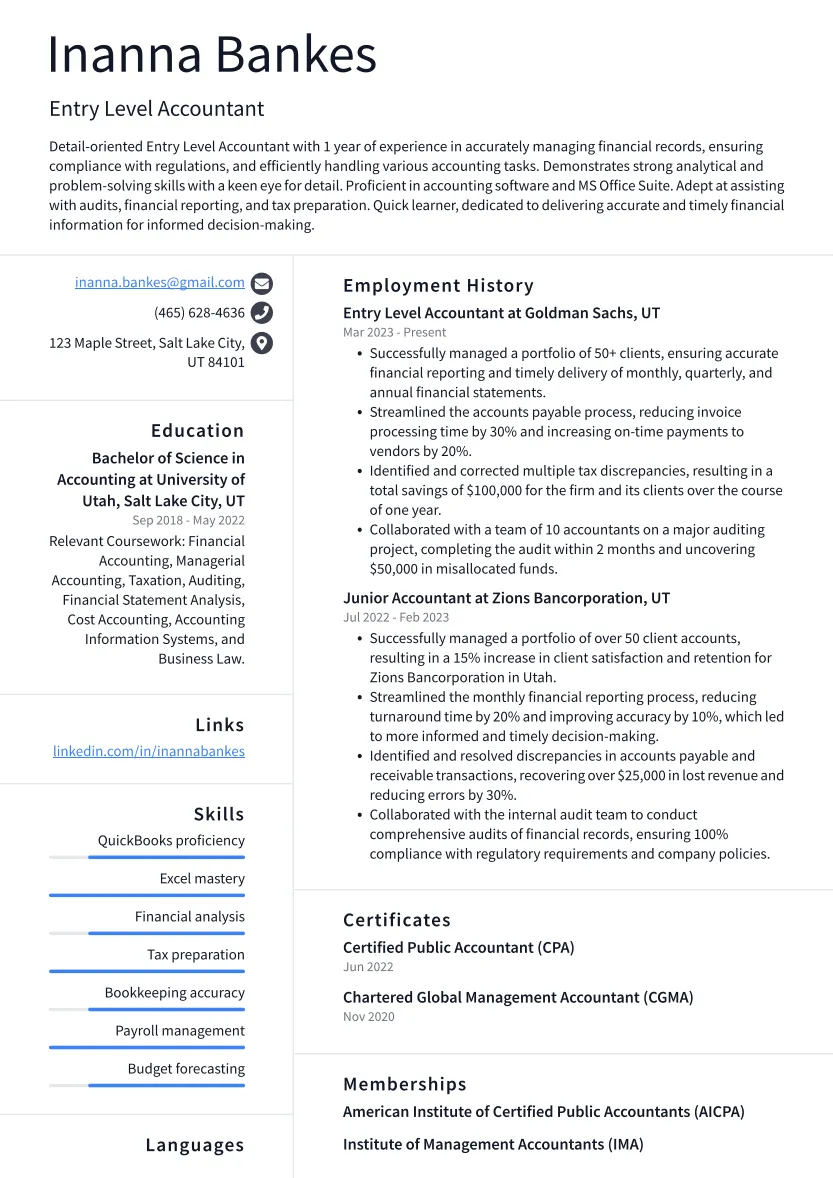Crafting Your Accounting Cover Letter
An effective accounting cover letter is your first chance to make a positive impression on a potential employer. It’s more than just a formality; it’s a strategic tool. This guide will help you craft a compelling cover letter that highlights your skills, experience, and enthusiasm, significantly increasing your chances of landing an interview. Remember, the cover letter acts as your personal introduction, showcasing why you’re the perfect fit for the role and the company. It complements your resume by providing context and personality, helping you stand out from other applicants. Let’s explore the essential elements of a standout accounting cover letter, ensuring you make a lasting impact and secure your dream job.
Understanding the Importance of a Cover Letter
In the competitive field of accounting, a well-written cover letter is essential for making a strong first impression. It offers a unique opportunity to demonstrate your personality, writing skills, and genuine interest in the position. Unlike a resume, which provides a concise overview of your qualifications, a cover letter allows you to narrate your story, connecting your skills and experiences directly to the job requirements. It’s your chance to explain why you’re not just qualified but also the right fit for the company culture and the specific role. Ignoring this vital step could mean missing out on opportunities, as many hiring managers view a cover letter as a key indicator of a candidate’s seriousness and attention to detail. Therefore, taking the time to craft a tailored and engaging cover letter can significantly boost your chances of moving forward in the application process.
Highlighting Skills and Qualifications
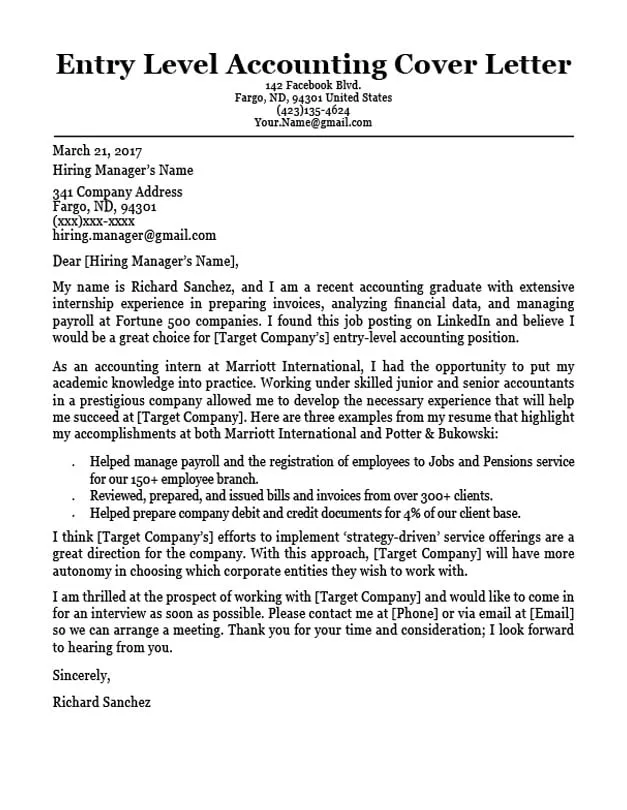
Your cover letter is the perfect space to showcase your relevant skills and qualifications in a way that complements your resume. Instead of simply listing your abilities, use the cover letter to illustrate how these skills translate into value for the employer. Identify the key requirements of the job description and provide specific examples of how you’ve successfully utilized your skills in past experiences. This approach demonstrates your capabilities and gives potential employers a clear understanding of how you can contribute to their team. Remember, it’s about showing, not just telling; provide concise examples that highlight your achievements and the positive outcomes you’ve delivered in previous roles or academic projects. The goal is to paint a vivid picture of your potential contributions and secure an interview.
Entry-Level Accountant Skills
For entry-level accounting positions, focus on highlighting foundational skills that demonstrate your readiness to learn and contribute. Emphasize your proficiency in areas like financial statement preparation, account reconciliation, and knowledge of accounting principles such as GAAP or IFRS. Mention any coursework, internships, or projects where you’ve gained practical experience, showcasing your ability to apply theoretical knowledge in real-world scenarios. Don’t forget to include soft skills such as attention to detail, organizational abilities, and problem-solving skills, which are critical for success in accounting roles. If you have experience with any accounting software, be sure to mention it; it’s a highly valued skill. These skills are essential for an entry-level accountant, so make sure they shine through your cover letter.
Relevant Software Proficiency
Proficiency in accounting software is a significant advantage in today’s job market. List the specific software programs you’re familiar with, such as QuickBooks, Xero, SAP, or Microsoft Dynamics. Include the level of your proficiency and any certifications you’ve obtained. If you have experience with data analysis tools like Excel or other spreadsheet software, be sure to mention it, since this is an important skill. Demonstrating familiarity with relevant software shows employers that you can hit the ground running, reducing the time and resources required for training. Be honest about your skill level, and emphasize any training or experience you have, highlighting any accomplishments you achieved by using the software. This provides potential employers with a clear picture of your technical capabilities and suitability for the role.
Formatting Your Accounting Cover Letter
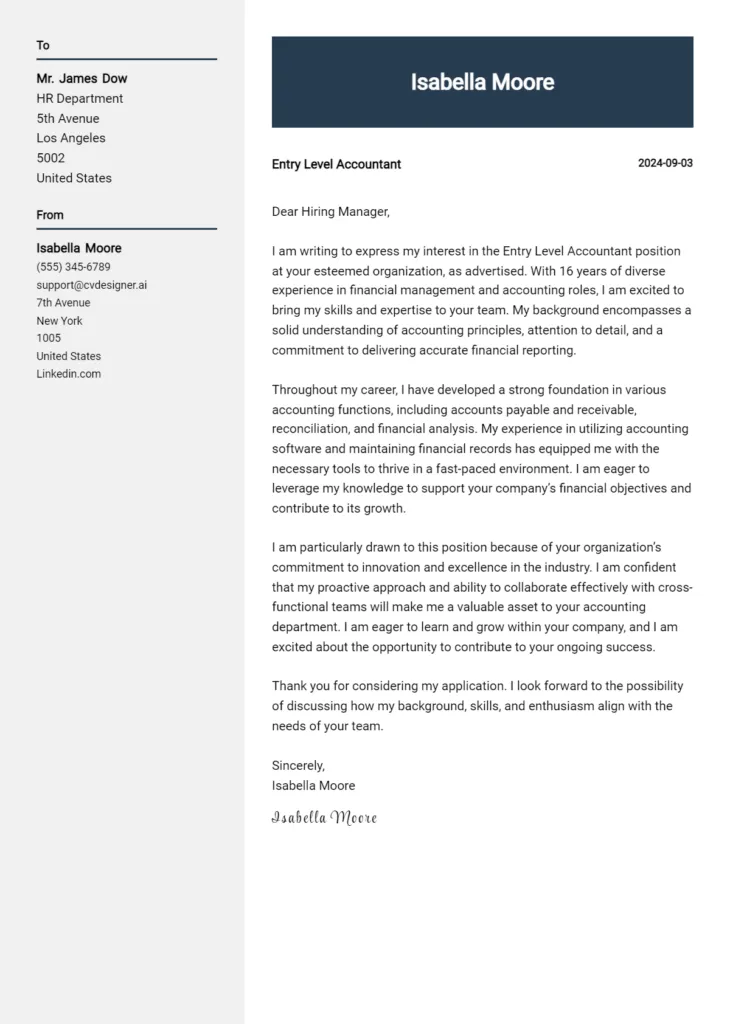
Proper formatting is crucial for presenting your cover letter professionally and ensuring it’s easy to read. A well-formatted cover letter reflects your attention to detail and professionalism, making a positive impression on the hiring manager. Maintain a clean layout with consistent fonts, clear headings, and adequate spacing. Use a standard business letter format and ensure your cover letter is easy on the eyes. Poor formatting can distract the reader, and undermine the content of your letter, so it’s worth investing the time to get it right. A well-formatted cover letter increases the chances that your skills and experiences will be noticed and appreciated.
Header and Contact Information
Your header should include your name, address, phone number, and email address. This information makes it easy for the hiring manager to contact you. Ensure that your contact information is up-to-date and professional; use a professional email address, avoid using nicknames, and make sure your voicemail is set up correctly. The date should also be included, followed by the hiring manager’s name and title. This information is essential and should be placed at the top of your cover letter, clearly identifying you and providing the necessary contact details for the potential employer to reach you.
Proper Salutation
The salutation sets the tone for your cover letter. If possible, address the hiring manager by name. Research the company and find the name of the hiring manager or the person to whom you are submitting your application. If you cannot find a specific name, use a professional greeting like “Dear Hiring Manager.” Avoid generic greetings such as “To Whom It May Concern,” since these suggest you haven’t done your research or personalized your application. Personalizing your salutation shows that you care enough to find out who will be reading your application and that you are interested in the specific opportunity.
Body Paragraph Structure
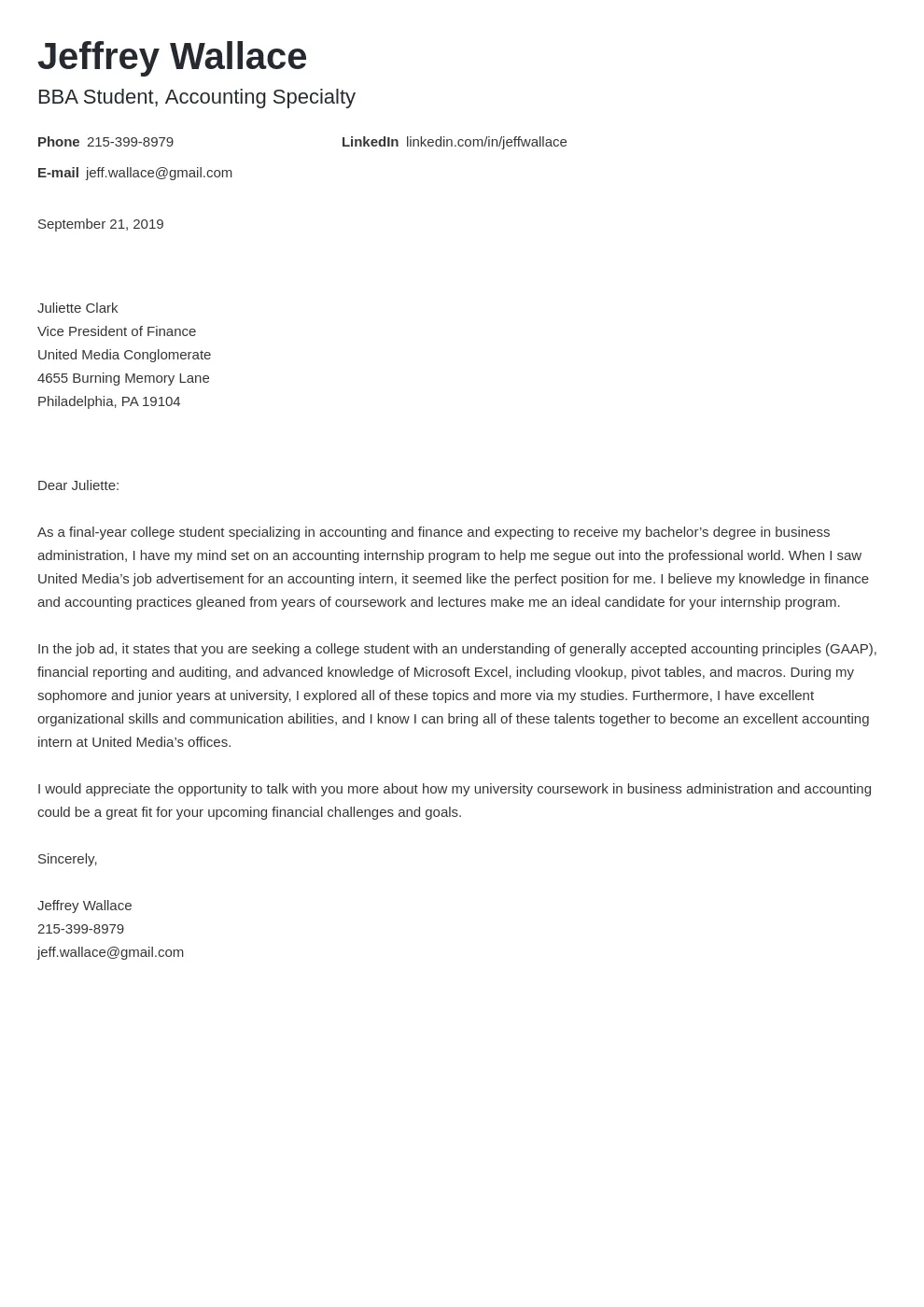
The body of your cover letter is where you make your case for why you’re the right candidate. Structure your body paragraphs logically, using a clear and concise style that makes it easy for the reader to follow your points. The structure should include an opening paragraph that captures attention, middle paragraphs that highlight your skills and experiences, and a closing paragraph that reinforces your interest and calls for action. This format helps to organize your thoughts and makes your letter more compelling and effective.
Opening Paragraph
Your opening paragraph should immediately grab the reader’s attention. State the position you are applying for and how you learned about the opportunity. Briefly mention why you’re excited about the role and the company. It is also appropriate to highlight a key skill or achievement that makes you stand out. Keep it concise and engaging, and make a strong first impression that encourages the reader to continue to review your letter. This paragraph sets the tone for the rest of the letter, so be sure to include enthusiasm and show you’re a great fit for the position.
Middle Paragraphs
Use the middle paragraphs to provide specific examples that highlight your skills and experiences. Connect your qualifications to the job requirements outlined in the job description. For each skill you discuss, provide a brief example of how you’ve used it to achieve positive results. Quantify your accomplishments whenever possible, using numbers to illustrate your impact, whether it’s the amount of money you saved or the efficiency you gained. Focus on relevant experiences and avoid repeating information from your resume. This section should be concise and demonstrate your value to the employer.
Closing Paragraph
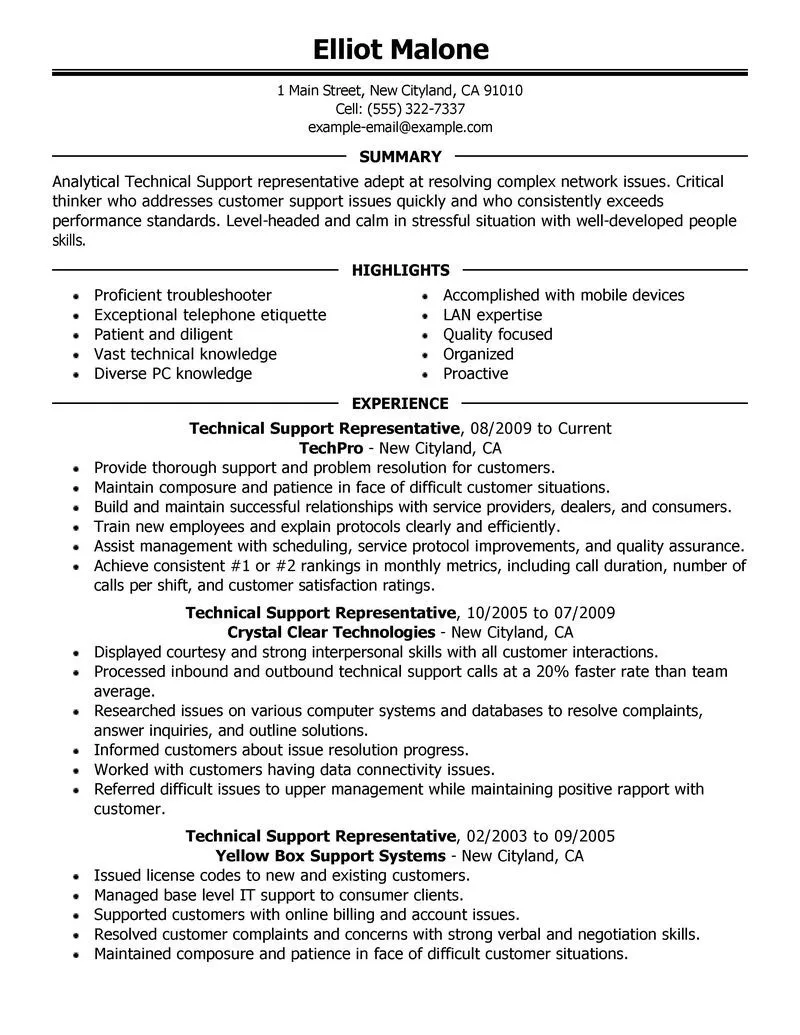
Your closing paragraph should reiterate your interest in the position and the company. Thank the hiring manager for their time and consideration. Express your enthusiasm for the opportunity and reiterate your eagerness to discuss your qualifications further in an interview. Include a call to action, such as stating that you look forward to hearing from them soon or that you are available for an interview. Make it easy for them to contact you by including your contact information again if needed. This ensures you conclude your letter on a positive and proactive note.
Proofreading and Editing
Proofreading and editing are crucial steps that should never be skipped. Typos, grammatical errors, and formatting mistakes can undermine your credibility and professionalism, which can lead to your cover letter being rejected. Carefully review your cover letter for any errors in spelling, grammar, and punctuation. Ensure that your sentences are clear, concise, and well-structured. It can be helpful to have someone else review your letter for you, as a fresh pair of eyes can often catch errors you may have missed. Taking the time to carefully proofread and edit your cover letter shows that you pay attention to detail and are committed to excellence.
Cover Letter Examples
Reviewing examples can provide helpful guidance on how to structure and write your own cover letter. Study these examples to understand how to tailor your cover letter to different situations, such as recent graduates, career changers, and those with limited experience. Adapt the examples to your specific background and the requirements of the job you are applying for. By observing these real-world examples, you can learn how to effectively showcase your skills and experiences. Remember to personalize each letter to reflect your unique qualifications and your enthusiasm for the particular opportunity.
Example 1 Recent Graduate
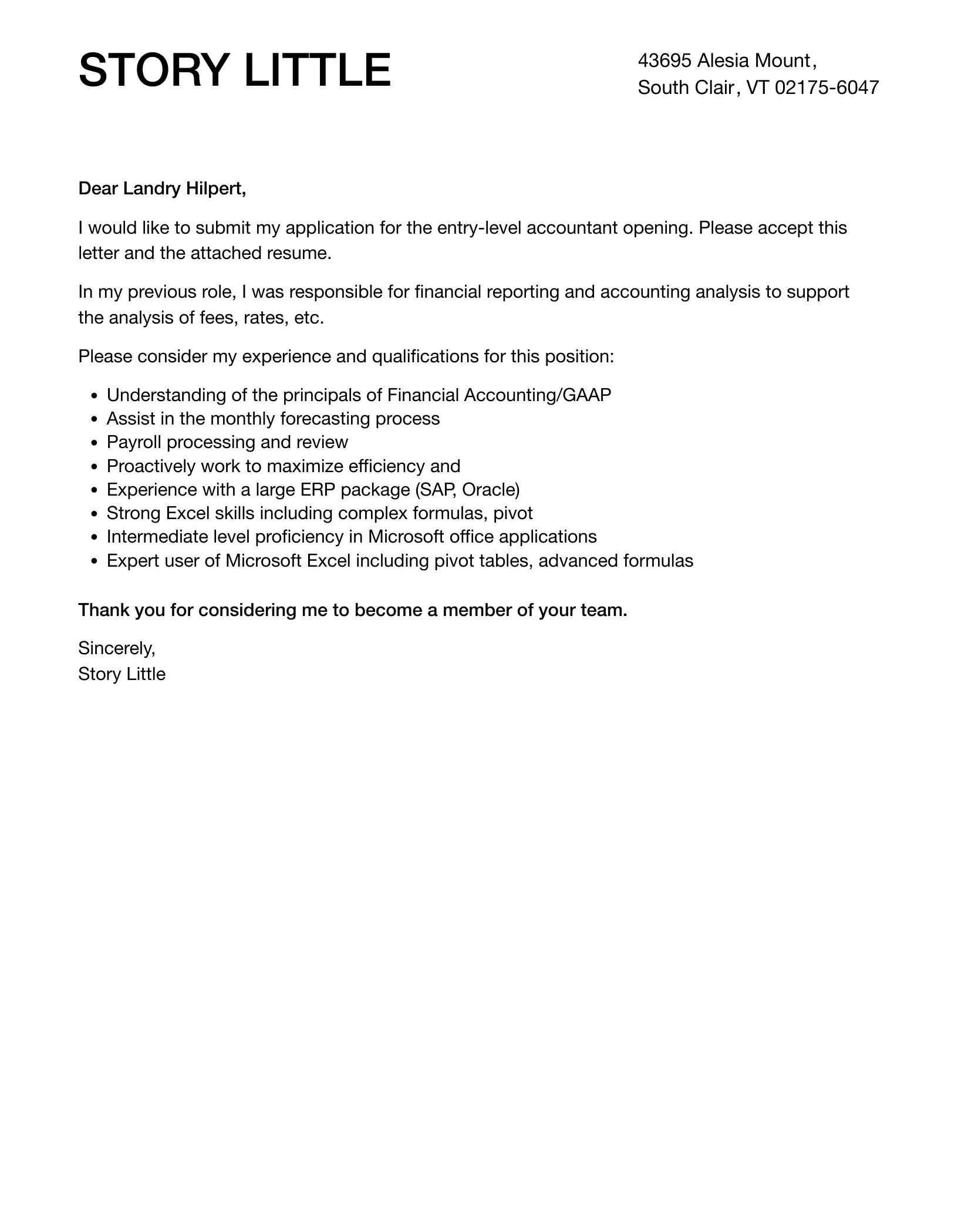
A recent graduate should focus on highlighting academic achievements, internships, and any relevant projects completed during their studies. This can be a challenging situation, since you are just starting. You want to explain your qualifications in a way that the employer can see that you’re well-prepared to join their team. Mention any coursework or extracurricular activities that demonstrate your knowledge and skills. If you have any professional experience, even if it’s limited, highlight your role and the responsibilities you had. Express your enthusiasm for the field and your eagerness to learn and grow. You can also include some of your strong soft skills like attention to detail, time management, or teamwork. Ensure the letter clearly conveys the skills you’ve gained, your potential, and your genuine interest in the opportunity.
Example 2 Career Changer
When changing careers, focus on transferable skills and how your previous experiences align with the requirements of the accounting position. If you are changing careers, explain your motivation for making the change. Identify and showcase any skills or experiences from your past roles that are relevant to accounting. Highlight your education and certifications in accounting, and mention any relevant courses or training. Use the cover letter to explain the rationale behind your career change and demonstrate your commitment to the field. Show how your unique background can bring a fresh perspective to the role. Emphasize your willingness to learn and adapt, and convey your enthusiasm for your new career path. This allows you to create a strong impression and increase the chances of getting an interview.
Example 3 Limited Experience
For candidates with limited experience, it’s important to concentrate on academic achievements, internships, volunteer work, and any projects where you’ve demonstrated relevant skills. Highlight your eagerness to learn and grow within the accounting field. If you have any professional experience, even if it’s limited, highlight your role and the responsibilities you had. If you have any certifications, emphasize them in your cover letter. Showcase any training you have received. If you have any soft skills like communication skills, attention to detail, time management, or teamwork, mention them in your cover letter. Express your enthusiasm for the field and your eagerness to learn and grow. The letter should clearly convey the skills you’ve gained, your potential, and your interest in the opportunity.
Tailoring Your Cover Letter
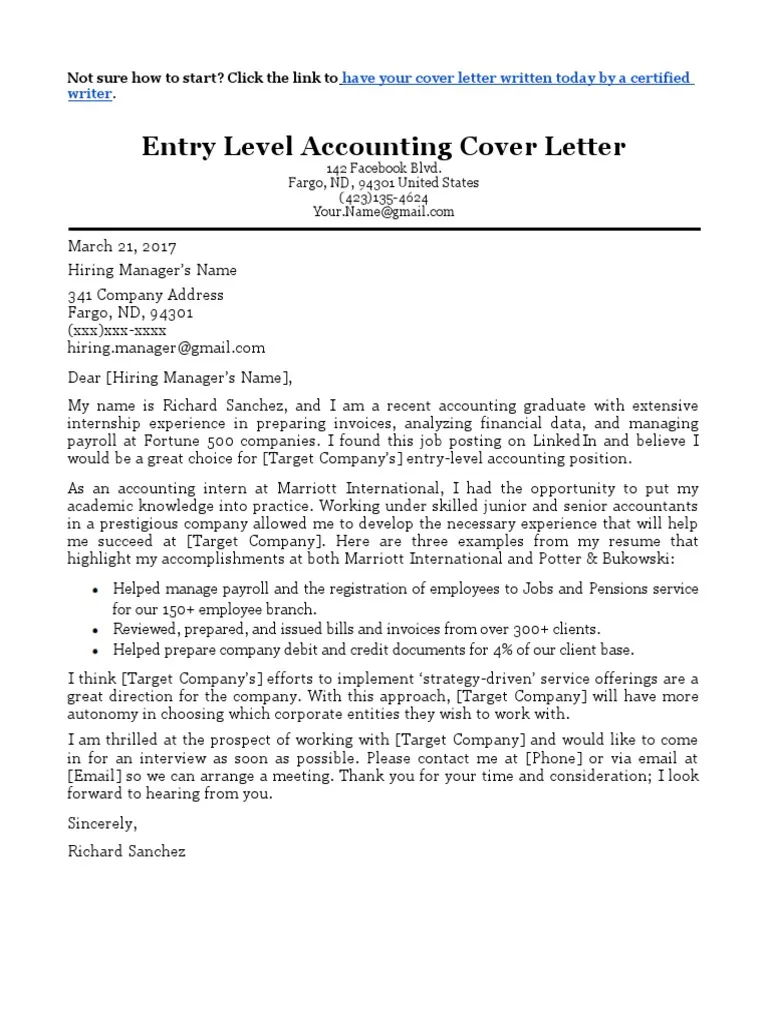
Tailoring your cover letter to each specific job is a vital step in the application process. Generic cover letters are easily recognizable and often disregarded by employers. Demonstrate your attention to detail and your genuine interest in the position and company by personalizing each cover letter. This is your opportunity to demonstrate why you’re the best fit for this role.
Researching the Company
Before writing your cover letter, research the company. Understand its mission, values, and recent projects or initiatives. This helps you demonstrate your genuine interest and allows you to tailor your letter to match the company’s culture and needs. Visit the company’s website, read news articles, and check social media profiles. Tailor your letter to align your skills and experiences with the company’s goals. Refer to specific company projects or values to show that you’ve done your homework. This level of detail shows the hiring manager you are genuinely interested in the role and the company. This research makes your letter more compelling and demonstrates your investment in the opportunity.
Matching Skills to Job Requirements
Carefully review the job description and identify the required skills, qualifications, and experiences. Align your cover letter to showcase these skills using relevant examples from your past experiences. This helps the hiring manager quickly recognize how your skills and experiences meet their specific requirements. Highlight the most relevant skills and experiences, and provide specific examples of how you’ve successfully applied these skills. Quantify your achievements whenever possible, and provide metrics to demonstrate your value. This focused approach increases the relevance of your application and enhances your chances of getting an interview. This targeted approach ensures that your letter addresses the employer’s needs.
Showcasing Your Enthusiasm
Showcasing your enthusiasm for the role and the company is crucial. Use your cover letter to express your genuine interest in the position and the organization. Mention the aspects of the company or role that particularly excite you. Demonstrate your passion for accounting and your desire to contribute to the company’s success. Your enthusiasm will make you stand out. Express your genuine interest in the role and the company, and it increases your chances of landing an interview and ultimately getting the job. Use your cover letter to make a strong first impression and create a lasting positive impression.
